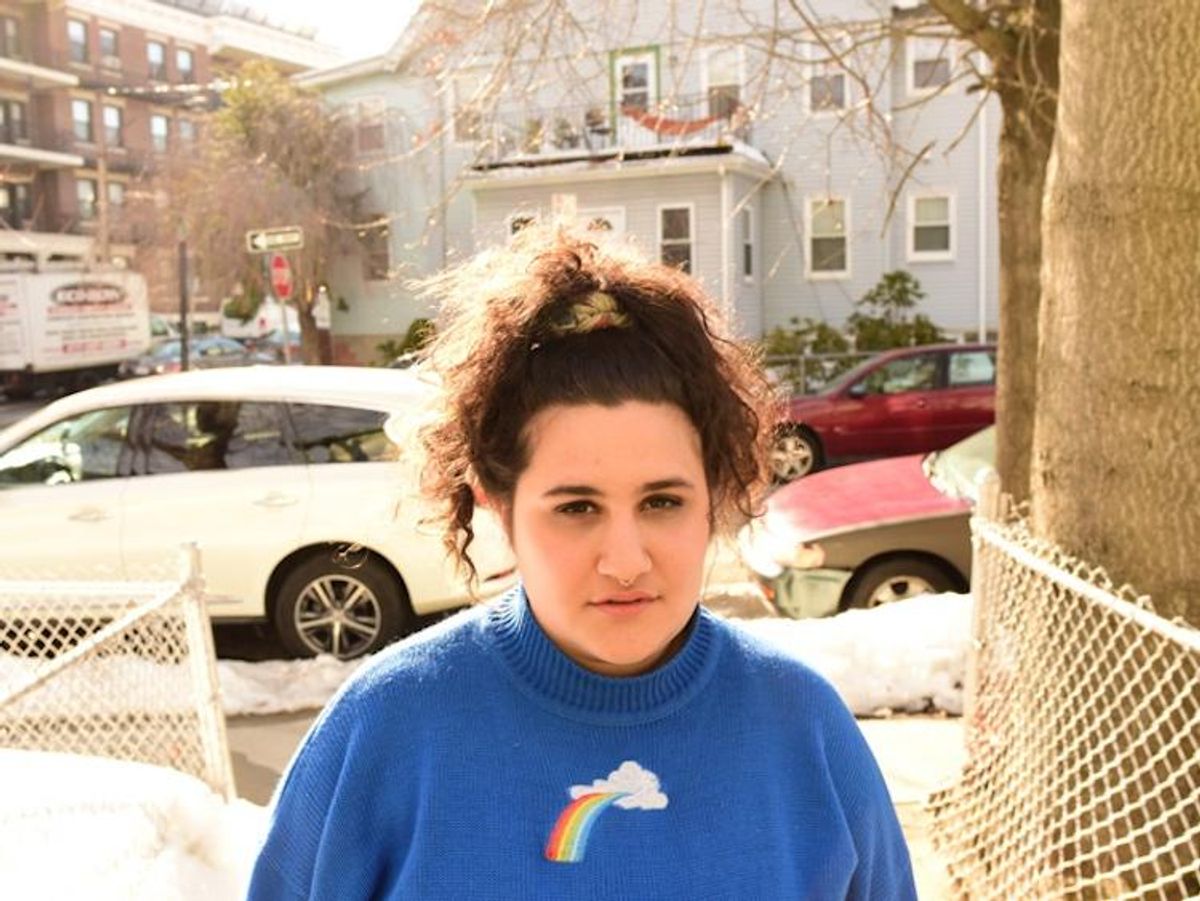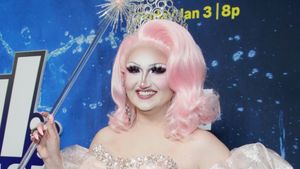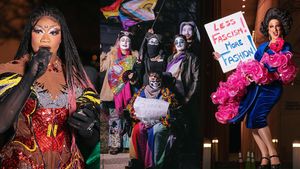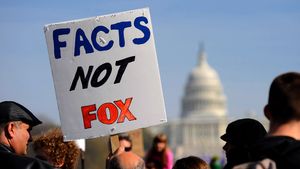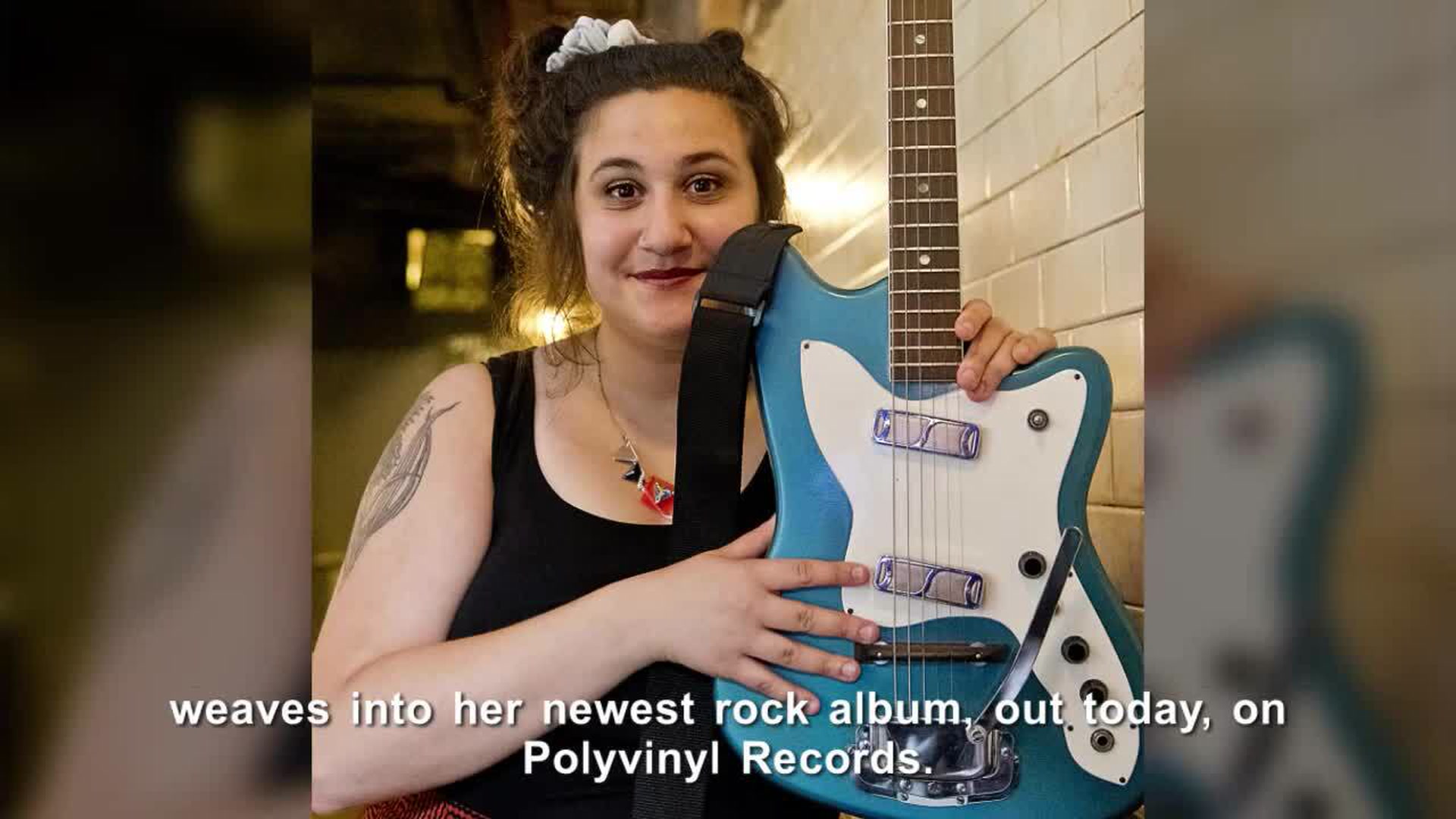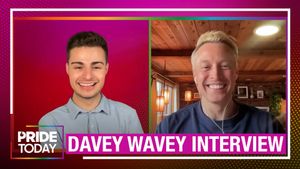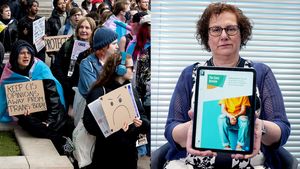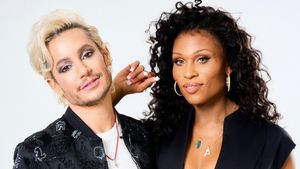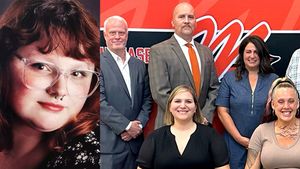Don't let this young artist's age fool you--A Place I'll Always Go is the wonderfully mature sophomore album from Palehound (Ellen Kempner). After experiencing both tragic loss and first love, the 22-year-old Boston musician emerged from the experiences with newfound wisdom that she expertly weaves into her newest rock album, out today, on Polyvinyl Records.
Kempner's music embodies the very essence of the queer experience--of blending the binaries of pain and pleasure, softness and harshness. The way she speaks echoes all these lovely contradictions life inevitably offers. Equally bubbly and contemplative, the musician talks with OUT about her songwriting process, queer relationships and the endless journey of figuring it all out. Stream A Place I'll Always Go, below.
OUT: It's clear that both pain and pleasure went into A Place I'll Always Go. What's it like to create music from such a place of mixed emotions?
Ellen Kempner: When I was creating the music, I was never in a very conflicting... well, there are a couple songs that have those elements of pain and happiness intertwined. But most of the time, each song tackles a very different thing. There are some songs that tackle pain and some songs that tackle pleasure. They're two things that I've written about, but in very different ways before. In the past, I was definitely writing more about the pain of relationships, so the pain of pleasure, whereas now I have since then experienced pain and pleasure as different things that exist totally independently with different situations. That was interesting to separate that a little bit and tackle those issues independently and have them not be intertwined.
What was the inspiration for the album?
I wrote it all in the past two years. Over that time, I had moved to Boston and started a new life--forged a really strong friendship with somebody who ended up passing away pretty tragically [and] suddenly. So that was very shocking and devastating. In close succession after that, my grandmother passed away and I had very luckily not experienced much personal loss up until then. It was all over the course of like one month this happened. I was very close to my grandmother, so to see different kinds of death, the polar opposite kinds--tragic and young and then old and peaceful. It really scared me and made me hyper aware of my actions, my life and the lives around me. Writing songs about it actually really helped release some of that energy that was very pent up. Six months after that, I started seeing someone who I'm still with and she's super wonderful, so I wrote a lot about that too. I wrote successful love songs for the first time (Laughs).
Had you written unsuccessful love songs before?
I experimented with writing love songs just because I like love songs a lot, so I would try to write love songs just as a game. But I'd never experienced it before and just had these elements that were missing.
What were the missing elements?
Just an understanding of what a queer relationship is actually like, honestly, and just the casualness of it. I think I had always blown it up as this big, dramatic endeavour and this really huge thing. There's so much of a queer relationship that's just me and my girlfriend watching hours of TV and adopting a cat and doing very mundane things together. I think that was an aspect of love I hadn't really understood before.
That's really interesting, the casual versus the dramatics. Do you think that's unique to queer relationships, that appreciation of the smaller, more mundane things?
I think the reason I emphasized it as a queer thing is because there's also so much build-up when you're a queer person and you're discovering your identity--working with yourself to allow yourself to have a relationship and to accept that that's a part of yourself and that this is the person you want to be with. I feel like there's even more buildup and more expectation because you're putting a lot on the line. To be out as queer and to know you're queer... there's a lot of pain in that process. I think that that made it even more dramatic, eye opening experience for me to see that a relationship is not this really grandiose thing.

A Place I'll Always Go
Is there a song on the album that reflects this?
Like the song, "Room," on my record is about my experiences having my own bedroom and how they've changed as a result of seeing someone. Before I would just kind of hang out in my room with my laptop, watch TV and snack in bed... do bullshit stuff. Now there's this whole other presence.
What was it like for you to come into yourself as a queer person?
When I was in fifth grade, I wore Alice Cooper t-shirts and I was always aware of the fact that I wasn't dressing like other girls in my grade. I wasn't relating to a lot of boy talk and I thought that was just normal and I was a tomboy, which is also an experience that people go through being straight. But for me, there was something that was fundamentally different that I could feel when I was a kid. By the time I was 15 or 16 and I was actually hooking up and dating guys who were all very hot, cool, nice guys, but I was so not into them at all. So I was like, wait a second, if I'm not into this guy or this handful of dudes, then I'm probably not into dudes.Then I went through the bullshit of experimenting and have people also experimenting with me and the heartbreak of that in high school, and then came out to my parents and my friends when I was in high school, but was not out and open. I was out to about ten people and then I went to college and gay'd it up.
How do you see this album relating to your last one?
I'm much more proud of this one, because usually I'm very critical of myself, and I am even with this record to some extent, but with the last record I was very unsure about it. This one I feel really comfortable about and I kind of said what I wanted to say for the first time and was really open about it. I do see it as a departure in terms of me accepting a lot of things about myself as a person and as a songwriter that have led to me being more open about my life. I used to lyrically include a lot of metaphors and code things a lot, make things obscure and it's up to the listener to figure out what I'm actually talking about, but this one I feel like I actually point-blank say what I want to say without any weird cryptic lyrics.
What is your songwriting process like?
I was doing a lot of commuting on the bus when I wrote this record. I always think of song ideas on the fucking bus on my way to work--just ideas coming to me in really inconvenient places and then me having to wait a while to sit down with a guitar and figure it out. I have a lot of anxiety, so I think of a song and then experience a lot of self doubt and then have to come back to it. The song, "If You Met Her," I wrote in one sitting, which barely ever happens. A lot of those songs took a lot of going back to.
You wrote "If You Met Her" in one sitting?
I wrote it on the one-year anniversary of my friend's passing, so I took the day off work and I was just like, "I have to do something to process this," and it led to me sitting down for hours and working on that song, which was very cathartic and helped a lot that day.
Why did you decide to title the album A Place I'll Always Go?
I mentioned earlier that I have terrible anxiety and naming the album was impossible for me for weeks. I was very proud of it, it was done, and I was proud of the songs individually. I was like, "How can I pick a phrase or a word to sum this up?" I dug through lyrics on the album and tried to find one, but none of them fit. The album title kind of fell in my lap in this really nice way; my friend Sammy, who actually did a lot of illustrations for the album had the record months ago, right after I finished recording it, so they could start drawing stuff for it. They texted me right out of the blue one day and they said something really sweet along the lines of, "This album is really special to me, it's a place I'll always go to feel close to my best friend." And I just loved that, I was like, "Thank you, you just gave me the album title."
